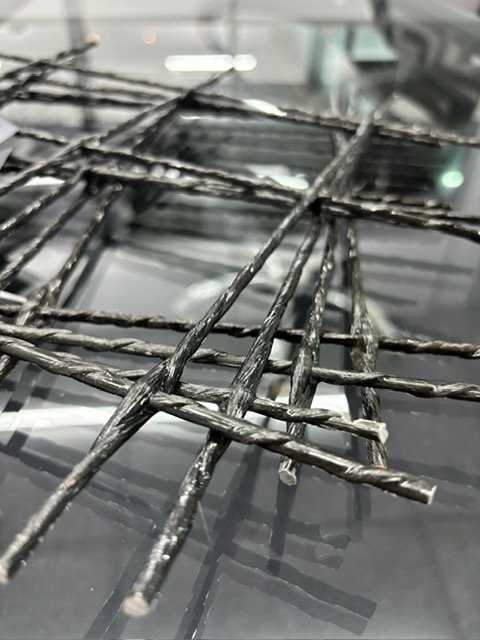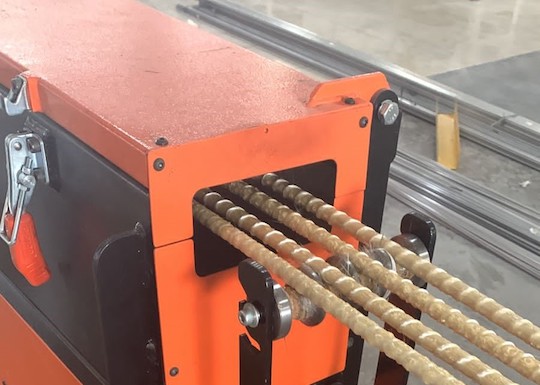Composite Rebar
Composite Rebar
Composite rebar offers an excellent solution for modern infrastructure and construction projects. Composite rebar is a cost-effective alternative to traditional steel while being stronger, corrosion-resistant, and lighter. It is designed to meet the growing demands of sustainability and fix common problems of steel rebar, like corrosion or heavy weight. If you are looking for a future-proof reinforcement solution, feel free to reach out and learn how our composite rebar production line can support your new project.

What is Composite Rebar?
Composite rebar is a high-performing reinforcement product made from fiber-reinforced polymers, combining a resin matrix (typically epoxy, vinyl ester, or polyester) with reinforcing fibers such as glass, carbon, or basalt.
These materials provide superior strength, corrosion resistance, and exceptional durability compared to traditional steel rebar, eliminating issues like rust and degradation in harsh environments. Composite rebar offers excellent tensile strength, though its compressive strength is generally lower than steel, and it can be engineered for flexibility (bendable) where needed. Its lightweight nature simplifies handling, reduces transportation costs, and contributes to a lower carbon footprint. These attributes make composite rebar ideal for modern construction projects, including bridges, marine structures, and buildings.
Our advanced production lines support the manufacture of GFRP (Glass Fiber Reinforced Polymer), CFRP (Carbon Fiber Reinforced Polymer), and BFRP (Basalt Fiber Reinforced Polymer), ensuring you can select the optimal rebar type for your specific application, delivering strength and sustainability for a stronger future.

Benefits of Composite Rebar
Composite rebar outperforms steel in several key areas, making it a superior reinforcement solution:
- 15% of the weight of steel, allowing for easier handling and transportation.
- Lower transport costs, as one truckload of composite rebar, equals nine truckloads of steel.
- Corrosion-resistant
- Two times stronger than steel
- Lower labor and equipment costs
- Improved thermal insulation
- No impact on electromagnetic fields
- Resistant to extreme temperatures
Applications of Composite Rebar in Modern Infrastructure
- Infrastructure projects
- Building Construction
- Water treatment plants
- Maintenance and renovation projects

Composite rebar vs steel rebar
The data decisively highlights the numerous advantages of composite rebar compared to traditional steel rebar, particularly when assessed in a direct comparison. Steel rebar is highly vulnerable to corrosion in environments exposed to saltwater or aggressive chemicals, resulting in a reduced lifespan. In contrast, glass fiber-reinforced polymer (GFRP) rebar is inherently non-corrosive, enabling it to outlast conventional steel alternatives considerably.
In terms of strength, composite rebar consistently surpasses steel rebar in nearly every category. For example, in terms of tensile strength, fiberglass rebar demonstrates an impressive capability that is approximately six times greater than that of steel. Furthermore, composite rebar exhibits exceptional compressive strength, highlighting its superiority over steel rebar. However, it’s essential to acknowledge that steel maintains an edge in transverse shear strength when compared to GFRP rebar.
The bonding capabilities of rebar to concrete are crucial. Composite rebar, such as fiberglass rebar, adheres to concrete almost twice as effectively as steel. While concrete’s strength lies in its compressive capabilities, it does have a drawback in bending. To mitigate this weakness, rebar is embedded within the concrete to enhance its resistance to bending. The rebar used should minimize bending; excessive strain would be transferred to the concrete itself. Therefore, it is vital to use a rebar that exhibits minimal stretch or bending. Composite rebar excels in this regard, with an ultimate strain that is approximately eight times superior to that of steel, while steel exhibits roughly three times the stiffness.
Another significant advantage of composite rebar over steel rebar is its weight. Composite rebar is approximately four times lighter than steel, enabling trucks to transport significantly more rebar while remaining within weight limits. This means trucks can carry approximately nine times more composite rebar than steel, which drastically reduces transportation costs. Transporting raw materials becomes easier, contributing to cost savings and decreased CO2 emissions.
Given these numerous benefits, you might expect composite rebar to be more expensive than steel. Surprisingly, this is not the case. With an efficient rebar production line, the manufacturing costs of composite rebar can be lower than those of steel rebar. In a direct comparison, composite rebar emerges as the clear victor. With options like fiberglass rebar available, customers can select the variation that best meets their needs and production goals.

The Future of Composite Rebar
The construction industry is shifting towards new and innovative materials like composite rebar. This is backed up by a yearly market growth of 10% and rising global demand. Together with a push for reduced carbon footprints and improved structural longevity, composite rebar stands out as a key solution for the future of construction. Composite rebar has many advantages but one of the most important ones has to be the reduced weight. This 6x lighter material ensures trucks can carry up to 9x more composite rebar than steel rebar. This goes together with a lower need for maintenance and contributes to lower environmental impact and overall cost savings.
Get Future-Proof with Our Composite Rebar Production Line
Our composite rebar production lines are designed to ensure manufacturers get the best possible product while reaching the highest speed possible. With CE-certified quality, advanced software, and our newest technology, we have created a trusted solution for manufacturers who want to create great-quality products. If you are interested in ordering your new next line, please feel free to contact us below.

Let's work together
Fill in this contactform and we will contact you!

